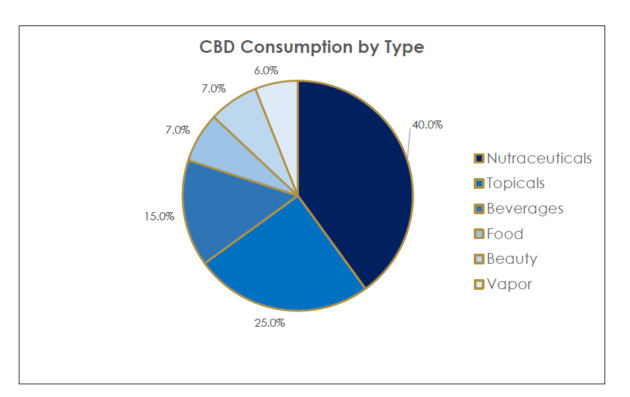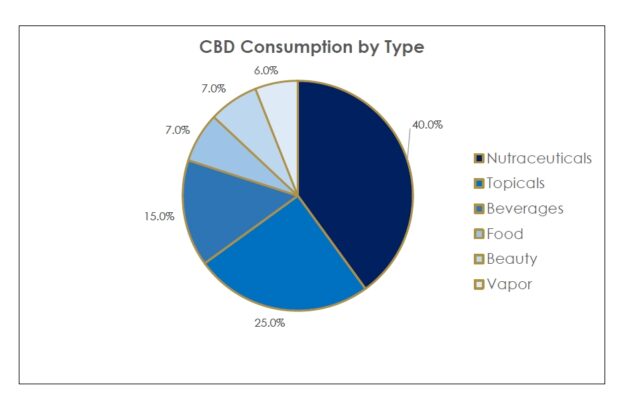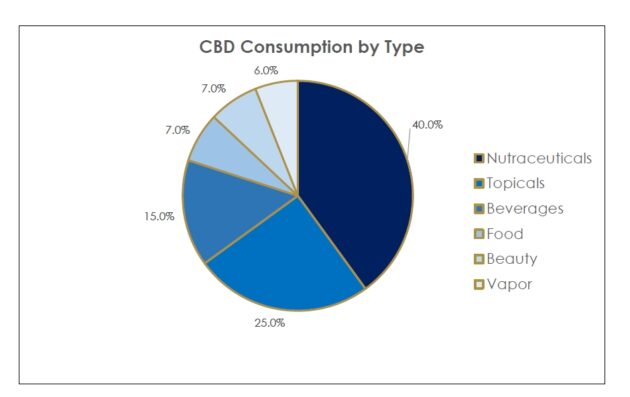
CBD food market identified as major Canadian economic recovery opportunity – new report on food and beverages
Food in Canada Staff
Products Bake & Snack Food Beverages Confectionery Health & Wellness Ingredients & Additives CBD CHFA economic recovery

 The report, which can be found here, outlines CBD products consumed by type in the U.S. (report page 19):
The report, which can be found here, outlines CBD products consumed by type in the U.S. (report page 19):


Most consumed is nutraceuticals (foods containing health-giving additives and having medicinal benefit), followed by topicals, beverages, food, beauty and vapor. The report states that “assuming that Canadian consumers have similar preferences for CBD products and their tastes do not change over time, we can project the rise in demand for each type of CBD products over time. By 2023, nutraceuticals are expected to represent one-third of the market or about $1 billion.”
The report authors also state that “according to estimates by ArcView and BDS Analytics, the sale of CBD products doubled in 2019 in the U.S. This was driven by the states that have moved to deregulate CBD and allow it to be used as a food additive. However, because of the FDA regulations, most of the growth so far has been generated by licensed dispensaries in the states where cannabis has been legalized. Several U.S. studies project significant growth in the CBD market if the FDA relaxes its
regulation of CBD products. Under that scenario, it is expected that CBD product sales will grow rapidly over the next five years as consumers become more informed about potential benefits of CBD products.”
Dan Demers, Vice President of Government Relations and Regulatory Affairs at CHFA, says “We want to show the potential this has to benefit industries across Canada. This is especially important in the wake of the COVID-19 pandemic. We are not in the same policy, health or decision-making environment we were a short six months ago. Canada needs opportunities like this to support economic recovery, be well positioned for new export markets when they open, and to create jobs for Canadians in communities across the country. A market for CBD health products is the economic opportunity Canada needs, but we are set to lose out if we don’t move quickly to regulate the ingredient differently.”
Currently, there are no legal means to bring non-prescription CBD health products to the Canadian marketplace. With a growing number of Canadians using CBD to support their wellbeing, but no legal pathway to bring CBD health products to market, strong consumer demand is promoting an illicit market for these products. CHFA believes the NHP pre-market approval system is well equipped to support the development of CBD health products with safety, efficacy and quality oversight.
“We commissioned the IFSD to measure the economic opportunity presented by a market for CBD health products in Canada. We have seen reports on the size of the CBD market in other jurisdictions, like the United States or the United Kingdom, but we want to be able to show key decision makers the size of the potential CBD health product market here in Canada, contingent upon a change in regulation. As the first G7 nation to legalize cannabis and also having a world-renowned system for NHPs, Canada is poised to support a thriving CBD health product market with a change in policy,” said Demers.
“We assessed the economic impact of these regulatory changes if they were to have occurred in 2019. Our modelling suggests that a market for CBD health products could contribute about $1.9 billion to the Canadian economy in the first year, growing at an average rate of nearly 7% each year. There’s potential for market size to reach approximately $2.5 billion five years following a change in regulation,” said Kevin Page, President and CEO of the IFSD at the University of Ottawa.
“A regulatory change could create thousands of full-time jobs for Canadians across the country, generating roughly 9,000 direct full-time equivalent positions (FTEs), and roughly 6,000 indirect and induced FTEs. A market for CBD health products has the potential to benefit a range of industries in Canada, beyond wholesale and retail. By 2023, modelling suggests the CBD market could raise real GDP by $2.1 billion and potentially generate 20,000 more FTE jobs,” said Page.
“We must act quickly. This is a significant missed opportunity for businesses wanting to fulfill the demand for CBD health products in Canada and around the world, but are constrained by current regulatory barriers. The demand that could be fulfilled by regulated CBD health products for consumers is largely being fulfilled by unregulated products through an illicit market. This is the case in other jurisdictions around the world, like the United Kingdom, Australia and the United States, but these jurisdictions are taking steps to create a regulated market for CBD. It would be a shame to watch Canada lose its first-mover advantage to the global CBD market as authorities around the world develop regulatory frameworks for CBD health products,” said Demers.
Based on the report’s findings, a new market for CBD health products would enable the growth of an innovative and globally competitive Canadian industry, create thousands of jobs for Canadians across the country, benefit a range of industries in Canada and spark investments in research and the creation of intellectual property.
Print this page